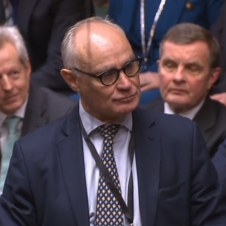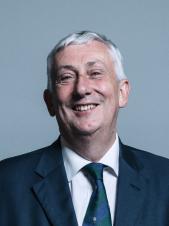We don't think religious worship should play any part in the formal business of the state.
We want to see parliamentary and local government meetings conducted in a manner equally welcoming to all attendees, whatever their personal beliefs.
Parliamentary prayers
Sittings in both the House of Commons and the House of Lords begin with Anglican prayers. MPs and peers stand for prayers facing the wall behind them – a practice thought to have developed due to the difficulty members would historically have faced of kneeling to pray while wearing a sword.
When the chamber is at its busiest, parliamentary prayers act as a bizarre and antiquated seat reservation system. Even MPs and peers who are slated to speak have no option but to attend prayers in order to reserve a seat.
Whilst they may be viewed by some as an important tradition, parliamentary prayers serve to assert the superiority of Christianity (and the Church of England in particular) at Westminster. This 'tradition' is inimical to a modern, pluralistic, secular democracy.
In the Scottish Parliament, Tuesday afternoon sessions begin with 'Time for Reflection', with faith and belief representatives invited to addresses members for up to four minutes. The Northern Ireland Assembly begins formal business with a period of two minutes of silent prayer or contemplation. The Welsh Assembly has adopted no such rituals.
Parliamentarians who wish to pray are free to do so. But prayers should not form part of the official business of Parliament.
Council prayers
Many local authorities in Britain also begin their meetings with prayer.
Local democracy should be equally welcoming to all sections of society, regardless of their religion or belief. Council meetings should be conducted without anyone feeling excluded, or compelled to either participate in prayers or absent themselves from part of the meeting.
Council prayers open the door to wholly unnecessary conflict and sectarian squabbles within local authorities. There is a history of local councillors being bullied and marginalised for challenging council prayers.
The absence of prayers from the formal business of meetings in no way impedes religious freedoms or denies anybody the right to pray. Conversely, organised worship in secular settings imposes worship on those who do not share the faith. A genuine commitment to freedom of religion or belief is incompatible with including acts of worship in the formal business of council meetings.
If local authorities wish to hold a moment of silent reflection at the beginning of a meeting, or if councillors wish to meet for prayers prior to the meeting, they are at liberty to do so.
Take action!
1. Write to your MP
Please enter your postcode and urge your MP to support an alternative to parliamentary prayers, to make parliament more welcoming to people of all faiths and none.
2. Share your story
Tell us why you support this campaign, and how you are personally affected by the issue. You can also let us know if you would like assistance with a particular issue - for example, if you would like to challenge prayers at your own council.
3. Join the National Secular Society
Become a member of the National Secular Society today! Together, we can separate religion and state for greater freedom and fairness.
Latest updates
Calls for parliamentary prayers review after MP compelled to attend
Posted: Wed, 15 Jan 2020 13:22
An MP has called for a review of the practice of holding parliamentary prayers after being effectively forced to attend in order to reserve a seat for prime minister's questions.
Crispin Blunt, the Conservative MP for Reigate, raised a point of order in the House of Commons on Wednesday in which he said the house's procedures committee should consider the issue.
In response the speaker of the house, Lindsay Hoyle, said Blunt was "quite right" and that the matter "needs to be taken up" with the committee.
The NSS welcomed Blunt's intervention and reiterated its call for an end to parliamentary prayers in response.
Prayers as de facto seat reservation system
Under parliamentary rules MPs can reserve seats by placing green cards on them early in the day, to indicate that they intend to attend the prayers which are held before each sitting. An MP who reserves a seat for prayers is considered to have reserved it for the rest of the day.
MPs who are attending committees during prayer time may also reserve seats by placing pink cards on them.
Blunt was unable to obtain a pink card on Wednesday because no committees have yet formed in the new parliament. As a result he was required to attend prayers to reserve his seat.
Campaign to scrap parliamentary prayers
Blunt was among 15 MPs who signed the early day motion EDM 1967, which called for the abolition of parliamentary prayers and was backed by the National Secular Society (NSS), last year.
The NSS also recently wrote to Hoyle to urge him to support a review of parliamentary prayers.
National Secular Society response
NSS chief executive Stephen Evans said: "Holding Anglican prayers as part of the official business of parliament is a divisive practice which sends an exclusionary message to those who do not wish to take part in them.
"And effectively forcing MPs such as Crispin Blunt to attend in order to do their jobs is a violation of freedom of conscience. This practice undermines efforts to ensure the UK's parliament reflects the interests of all its people, regardless of their religious beliefs or identities, and should be abolished.
"Members of parliament are free to pray at their own leisure, but institutionalised prayer doesn't belong in the legislative process."
Watch
Britain and religion
According to the most recent British Social Attitudes survey, just 12% of Britons are affiliated to the Church of England and 52% of people say they do not belong to any religion.
Review prayers in parliament, NSS urges new Commons speaker
Posted: Thu, 2 Jan 2020 14:01
The National Secular Society has urged the new speaker of the House of Commons to support a review of the practice of opening sittings in the house with Christian prayers.
In a letter to Lindsay Hoyle, the NSS said ending parliamentary prayers would "represent a positive step forward for modernity, equality and freedom of conscience".
The society urged Hoyle to work with the Commons procedure committee to review the current arrangement. Sessions in both houses of parliament currently open with Christian prayers.
The NSS said parliamentary prayers were "unfit for a modern legislature and at odds with an egalitarian society which respects the important principle of freedom of religion or belief".
It added that at busy times prayers act as a de facto seat reservation system.
The NSS also highlighted a motion which it backed in January 2019, in which MPs from across the political spectrum called for an end to parliamentary prayers.
Explaining the decision to write the letter, NSS chief executive Stephen Evans said: "Opening parliamentary sessions with Christian prayers is an exclusionary and divisive practice.
"Ending it would provide a statement that anyone is welcome in parliament, regardless of their religious beliefs or background, and that parliamentary procedures respect freedom of conscience.
"We urge the new speaker to bring whatever influence he can to bear to ensure parliament is open and welcoming to people of all religious beliefs and none."
Motion on parliamentary prayers
The motion tabled on parliamentary prayers last year, EDM 1967, said:
- religious worship should play no part in the formal business of the Commons;
- parliamentary meetings should be conducted "in a manner equally welcoming to all attendees, irrespective of their personal beliefs";
- parliamentary prayers were "not compatible with a society which respects the principle of freedom of and from religion".
At the time the chair of the procedure committee, Charles Walker, told the NSS he was "content to discuss" the proposal with the committee "once we have disposed of currently pressing business".
The NSS campaigns for an end to government prayers at both a national and local level.
Image: Official portrait of Lindsay Hoyle, © Chris McAndrew [CC BY 3.0]




